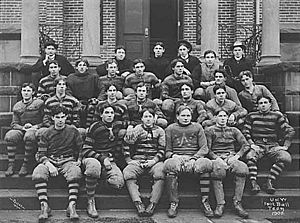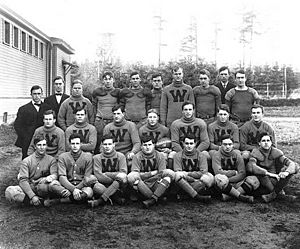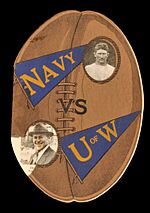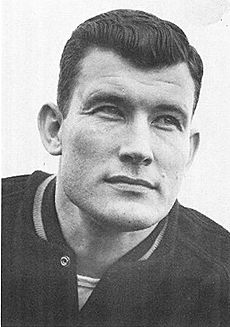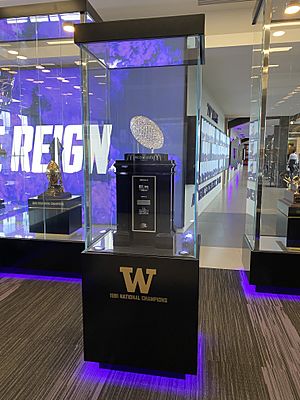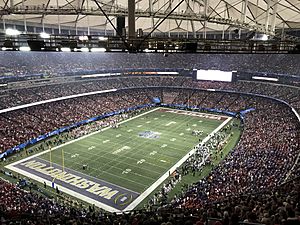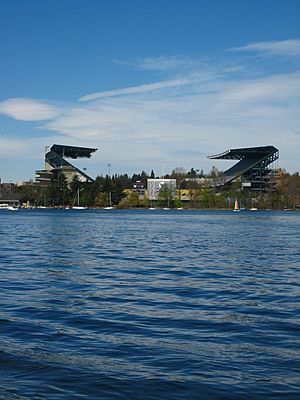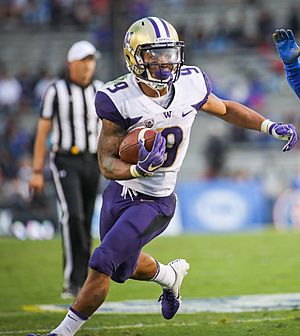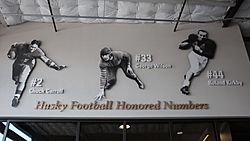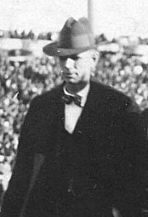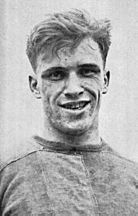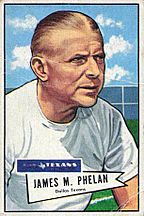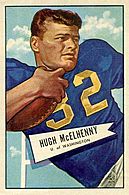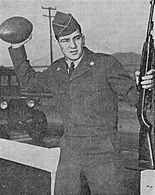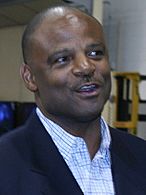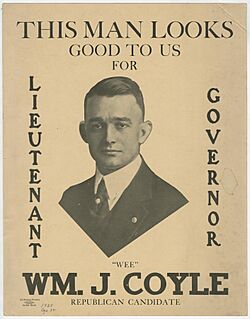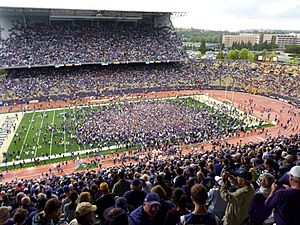Washington Huskies football facts for kids
Quick facts for kids Washington Huskies football |
|||
|---|---|---|---|
|
|||
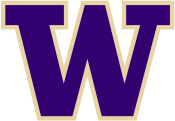 |
|||
| First season | 1889; 137 years ago | ||
| Athletic director | Patrick Chun | ||
| Head coach | Jedd Fisch 2nd season, 6–7 (.462) |
||
| Stadium | Husky Stadium (capacity: 70,138) |
||
| Field | Alaska Airlines Field | ||
| Year built | 1920 | ||
| Field surface | AstroTurf | ||
| Location | Seattle, Washington | ||
| NCAA division | Division I FBS | ||
| Conference | Big Ten Conference | ||
| Past conferences | Pac-12 (1959–2024) Pacific Coast (1916–1958) Northwest (1908–1917, 1922–1925) NIAA (1902–1907) WWIAA (1891–1898) |
||
| All-time record | 781–467–50 (.621) | ||
| Bowl record | 21–21–1 (.500) | ||
| Playoff appearances | 2 (2016, 2023) | ||
| Playoff record | 1–2 | ||
| Claimed national titles | 2 (1960, 1991) | ||
| Unclaimed national titles | 3 (1910, 1984, 1990) | ||
| National finalist | 1 (2023) | ||
| Conference titles | 18 (1916, 1919, 1925, 1936, 1959, 1960, 1963, 1977, 1980, 1981, 1990, 1991, 1992, 1995, 2000, 2016, 2018, 2023) | ||
| Division titles | 4 (2016, 2017, 2018, 2020) | ||
| Rivalries | Oregon (rivalry) Washington State (rivalry) Northwest Championship |
||
| Consensus All-Americans | 23 | ||
| Current uniform | |||
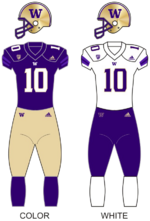 |
|||
| Colors | Purple and Gold |
||
| Fight song | Bow Down to Washington | ||
| Mascot | Dubs II Harry the Husky |
||
| Marching band | University of Washington Husky Marching Band | ||
| Outfitter | Adidas | ||
The Washington Huskies football team represents the University of Washington in exciting college football games. The Huskies play in the top division of college football, the NCAA Division I Football Bowl Subdivision (FBS). They are now part of the Big Ten Conference, after being a founding member of the Pac-12 Conference for over 100 years. Their home field since 1920 is Husky Stadium, located on campus in Seattle.
The Huskies have won 18 conference championships and seven Rose Bowls. They also claim two national championships, which are top honors in college football. The 1960 team beat the national champions, Minnesota, in the 1961 Rose Bowl. The 1991 team finished the season undefeated with a 12–0 record and was ranked No. 1 in the Coaches' Poll.
Washington's overall record ranks among the best in FBS schools. They hold the FBS record for the longest unbeaten streak at 64 games in a row. They also have the second-longest winning streak at 40 games. The school has had 13 seasons where they didn't lose any games, including eight perfect seasons.
Washington was one of the first four teams to form what became the Pac-12 Conference. They were one of only two schools that stayed in the conference without interruption until 2024. From 1977 to 2003, Washington had 27 seasons in a row where they didn't have a losing record. This was the longest streak in the Pac-12. The Huskies ended their time in the Pac-12 with a perfect 12–0 regular season. They then beat their rival Oregon in the last Pac-12 Championship Game and Texas in the Sugar Bowl. The team finished the 2023 season with a 14–1 record after losing to Michigan in the 2024 NCAA Championship Game.
Washington is often called a "Quarterback U" because many of its quarterbacks have gone on to play in the National Football League (NFL). Since Hall of Famer Warren Moon in 1976, 17 of the last 23 starting quarterbacks have played in the NFL.
Husky Stadium, Washington's home stadium, has been called the loudest college football stadium by ESPN.
Contents
- Team History: How the Huskies Began
- Early Days of Washington Football (1889–1907)
- The Gil Dobie Era: An Unbeaten Streak (1908–1916)
- New Coaches and a New Home (1917–1920)
- Enoch Bagshaw: Rose Bowl Appearances (1921–1929)
- James Phelan: More Success (1930–1941)
- The Jim Owens Era: National Champions! (1957–1974)
- Don James: The "Dawgfather" (1975–1992)
- Recent Coaches and New Beginnings (1993–Present)
- Conference History: Where the Huskies Played
- Championship Wins
- Meet the Head Coaches
- Bowl Games: Post-Season Fun
- Program Records: Top Achievements
- Rivalries: Big Games and Big Fun
- Facilities: Where the Huskies Play and Practice
- Traditions: Colors, Uniforms, and Sounds
- Individual Awards and Accomplishments: Star Players and Coaches
- Individual National Award Winners
- Individual Conference Award Winners
- Heisman Trophy Voting: Top Players Recognized
- Consensus All-Americans: The Best of the Best
- Honored Numbers: Special Recognition
- College Football Hall of Fame: Legends of the Game
- Pro Football Hall of Fame: NFL Greats
- Canadian Football Hall of Fame
- Rose Bowl Hall of Fame
- Notable in Other Fields
- Memorable Games: Exciting Moments in History
- Future Opponents: What's Next for the Huskies?
- Images for kids
Team History: How the Huskies Began
Early Days of Washington Football (1889–1907)
Organized football started at the University of Washington in 1892. In the first 15 seasons, ten different coaches led the team. The team grew from playing just a couple of games a season to ten games as the sport became more popular. Home games were played at different locations, with Denny Field becoming the main home field from 1895. The 1900 team played their in-state rival Washington State College to a 5–5 tie. This was the first game in what is now known as the Apple Cup.
The Gil Dobie Era: An Unbeaten Streak (1908–1916)
Gil Dobie became Washington's head coach in 1908. He coached for nine amazing seasons, with a record of 58 wins, 0 losses, and 3 ties. Dobie's teams were part of Washington's NCAA all-time longest 64-game unbeaten streak. During this time, they outscored opponents by a huge margin (1930 to 118 points). This streak also included a 40-game winning streak, which is the second-longest in NCAA Division I-A/FBS history. In 1916, Washington and three other schools formed the Pacific Coast Conference, which later became the Pac-12 Conference. In Dobie's last season, his 1916 team won the PCC's first conference championship. Dobie was honored in the College Football Hall of Fame in 1951.
New Coaches and a New Home (1917–1920)
After Dobie, Washington had several coaches. Claude J. Hunt led the team to their second PCC championship in 1919. This period ended with the team moving from Denny Field to its permanent home, Husky Stadium, in 1920. The team was called the "Sun Dodgers" in 1920 and 1921, before becoming the "Huskies" from 1922 onwards.
Enoch Bagshaw: Rose Bowl Appearances (1921–1929)
Enoch Bagshaw was the first former player to become head coach in 1921. He led the team to a 63–22–6 record. His teams also played in the Rose Bowl twice. They tied Navy 14–14 in the 1924 Rose Bowl and lost to Alabama 19–20 in the 1926 Rose Bowl. His 1925 team won the school's third PCC championship.
James Phelan: More Success (1930–1941)
James Phelan coached the Huskies for 12 seasons, with a 65–37–8 record. His 1936 team won the school's fourth PCC championship. They also won their first bowl game, beating Hawaii 53–13 in the 1938 Poi Bowl. Phelan was later inducted into the College Football Hall of Fame in 1973.
The Jim Owens Era: National Champions! (1957–1974)
In 1957, Jim Owens became Washington's head coach. Over 18 seasons, he had a 99–82–6 record. Owens led his teams to three conference championships and three Rose Bowl appearances. His 1960 team won the 1961 Rose Bowl against Minnesota. The Helms Athletic Foundation named the 1960 team national champions, which was the school's first national title in football. Owens resigned after the 1974 season and was elected to the College Football Hall of Fame as a player in 1982.
Don James: The "Dawgfather" (1975–1992)
Don James coached Washington for 18 years. His Huskies won four Rose Bowls and one Orange Bowl. His amazing 1991 Washington Huskies team finished with a perfect 12–0 record and shared the national championship with Miami.
The Huskies won 22 games in a row from 1990 to 1992. James's record with the Huskies was 153 wins, 57 losses, and 2 ties. He won national coach of the year awards multiple times and was inducted into the College Football Hall of Fame in 1997. Many experts consider the 1991 Washington Huskies one of the top 10 college football teams ever.
James resigned in 1993 due to penalties the conference placed on the team for rules violations. He said his resignation "probably saved his life." Don James passed away in 2013. In 2017, a bronze statue of him was placed at Husky Stadium, honoring him as "the Dawgfather."
Recent Coaches and New Beginnings (1993–Present)
After Don James, Jim Lambright coached the team, leading them to four bowl games. Then, Rick Neuheisel took over, winning the 2001 Rose Bowl. Neuheisel was later fired after admitting to taking part in a betting pool. Keith Gilbertson coached for two seasons, followed by Tyrone Willingham, who tried to improve the team's reputation.
Steve Sarkisian coached from 2009 to 2013, leading the Huskies to a winning record. Chris Petersen then became head coach in 2014. In his third year, Petersen led Washington to a Pac-12 title and their first College Football Playoff appearance in the 2016 Peach Bowl. He stepped down in 2019.
Jimmy Lake became coach in 2020, leading the team to a division title in the shortened 2020 season. He was later suspended and then fired. Kalen DeBoer took over in 2021. In his second season, DeBoer led the Huskies to a 14–1 record, winning the last Pac-12 championship and the Sugar Bowl. They played in the 2024 College Football Playoff National Championship game, losing to Michigan. DeBoer left Washington after the 2023 season.
Following DeBoer's departure, Washington hired Jedd Fisch as head coach on January 14, 2024. Washington also moved from the Pac-12 Conference to the Big Ten Conference for the 2024 season.
Conference History: Where the Huskies Played
Washington played its first football seasons as an independent team. They were a founding member of the Northwest Conference in 1908. In 1916, Washington also became one of the four original members of the Pacific Coast Conference (PCC). The PCC ended in 1958, and Washington, along with other teams, immediately formed the Athletic Association of Western Universities (AAWU) in 1959. This conference later became the Pacific-8, Pacific-10, and finally the Pac-12. Washington and California were the only two schools that were part of all these conferences from the beginning. On August 4, 2023, Washington and Oregon were invited to join the Big Ten Conference, starting August 2, 2024.
- Independent (1889–1907)
- Northwest Conference (1908–1917, 1922–1925)
- Pacific Coast Conference (1916–1958)
- Pac-12 Conference (1959–2024)
- Athletic Association of Western Universities (1959–1967)
- Pacific-8 Conference (1968–1977)
- Pacific-10 Conference (1978–2010)
- Pac-12 Conference (2011–2024)
- Big Ten Conference (2024–present)
Championship Wins
National Championships: Top Honors
Washington claims two national championships: 1960 and 1991.
The 1960 team was chosen by the Helms Athletic Foundation after they beat the national champion Minnesota in the 1961 Rose Bowl. Back then, the final polls were taken before the bowl games.
The 1991 team finished No. 1 in the Coaches Poll. They earned The Coaches' Trophy and other awards. This title was shared, as the AP Poll chose Miami (FL) as their champion.
Claimed National Titles
| Year | Coach | Selector | Record | Bowl | Opponent | Result | Final AP | Final Coaches |
|---|---|---|---|---|---|---|---|---|
| 1960 | Jim Owens | Helms Athletic Foundation | 10–1 | Rose Bowl | Minnesota | W 17–7 | No. 6 | No. 5 |
| 1991 | Don James | B(QPRS), BR, DeS, DuS, FN, FWAA, MGR, NCF, R(FACT), SR, UPI/NFF, USAT/CNN | 12–0 | Rose Bowl | Michigan | W 34–14 | No. 2 | No. 1 |
Other National Titles (Unclaimed)
Some groups also picked Washington as national champions in 1984 and 1990, but the school does not officially claim these titles.
| Year | Coach | Selector | Record | Bowl | Opponent | Result | Final AP | Final Coaches |
|---|---|---|---|---|---|---|---|---|
| 1910 | Gil Dobie | Bill Libby | 6–0 | N/A | – | – | ||
| 1984 | Don James | Berryman, Football News, National Championship Foundation (co-champion) | 11–1 | Orange Bowl | Oklahoma | W 28–17 | No. 2 | No. 2 |
| 1990 | Don James | R(FACT) (4 co-champions) | 10–2 | Rose Bowl | Iowa | W 46–34 | No. 5 | No. 5 |
Rose Bowl Championships: The Granddaddy of Them All
Washington has won 7 Rose Bowl championships and had one tie. The Rose Bowl was historically the most important bowl game for Pac-12 teams before the BCS era.
| Year | Coach | Game | Opponent | Result |
|---|---|---|---|---|
| 1923 | Enoch Bagshaw | 1924 Rose Bowl | Navy | T 14–14 |
| 1959 | Jim Owens | 1960 Rose Bowl | Wisconsin | W 44–8 |
| 1960 | 1961 Rose Bowl | 1961 Rose Bowl | Minnesota | W 17–7 |
| 1977 | Don James | 1978 Rose Bowl | Michigan | W 27–20 |
| 1981 | 1982 Rose Bowl | Iowa | W 28–0 | |
| 1990 | 1991 Rose Bowl | Iowa | W 46–34 | |
| 1991 | 1992 Rose Bowl | Michigan | W 34–14 | |
| 2000 | Rick Neuheisel | 2001 Rose Bowl | Purdue | W 34–24 |
Conference Championships: Dominating the League
Washington has won 18 conference championships. This includes titles in the PCC, AAWU, Pac-8, Pac-10, and Pac-12. They won at least one championship in every decade except the 1940s. Washington's 18 conference championships are the second-most in the league's history.
| Season | Conference | Coach | Conference record | Overall record |
|---|---|---|---|---|
| 1916† | PCC | Gil Dobie | 3–0–1 | 6–0–1 |
| 1919† | Claude J. Hunt | 2–1–0 | 5–1–0 | |
| 1925 | Enoch Bagshaw | 5–0–0 | 11–0–1 | |
| 1936 | James Phelan | 7–0–1 | 7–2–1 | |
| 1959† | AAWU | Jim Owens | 3–1–0 | 10–1–0 |
| 1960 | 4–0–0 | 10–1–0 | ||
| 1963 | 4–1–0 | 6–5–0 | ||
| 1977 | Pacific-8 | Don James | 6–1–0 | 10–2–0 |
| 1980 | Pacific-10 | 6–1–0 | 9–3–0 | |
| 1981 | 6–2–0 | 10–2–0 | ||
| 1990 | 7–1–0 | 10–2–0 | ||
| 1991 | 8–0–0 | 12–0–0 | ||
| 1992† | 6–2–0 | 9–3–0 | ||
| 1995† | Jim Lambright | 6–1–1 | 7–4–1 | |
| 2000† | Rick Neuheisel | 7–1 | 11–1 | |
| 2016 | Pac-12 | Chris Petersen | 8–1 | 12–2 |
| 2018 | 7–2 | 10–4 | ||
| 2023 | Kalen DeBoer | 9–0 | 14–1 |
† Co-champions
Division Championships
Washington won four Pac-12 North Division titles. These divisions were used from 2011 to 2021.
| Season | Conference | Division | Coach | Opponent | CG result |
|---|---|---|---|---|---|
| 2016 | Pac-12 | North | Chris Petersen | Colorado | W 41–10 |
| 2017† | Pac-12 | North | Chris Petersen | N/A: lost tiebreaker to Stanford | |
| 2018† | Pac-12 | North | Chris Petersen | Utah | W 10–3 |
| 2020 | Pac-12 | North | Jimmy Lake | N/A: unable to play due to not enough players available | |
† Co-champions
Meet the Head Coaches
| Tenure | Head coach | Record | Bowl record |
|---|---|---|---|
| 1892–1893 | W. B. Goodwin | 2–4–1 | |
| 1894 | Charles Cobb | 1–1–1 | |
| 1895–1896, 1898 | Ralph Nichols | 7–4–1 | |
| 1897 | Carl L. Clemans | 1–2 | |
| 1899 | A. S. Jeffs | 4–1–1 | |
| 1900 | J. S. Dodge | 1–2–2 | |
| 1901 | Jack Wright | 3–3 | |
| 1902–1904 | James Knight | 15–4–1 | |
| 1905 | Oliver Cutts | 4–2–2 | |
| 1906–1907 | Victor M. Place | 8–5–6 | |
| 1908–1916 | Gil Dobie† | 58–0–3 | |
| 1917, 1919 | Claude J. Hunt | 6–3–1 | |
| 1918 | Tony Savage | 1–1 | |
| 1920 | Stub Allison | 1–5 | |
| 1921–1929 | Enoch Bagshaw | 63–22–6 | 0–1–1 |
| 1930–1941 | James Phelan† | 65–37–8 | 1–1 |
| 1942–1947 | Ralph Welch | 27–20–3 | 0–1 |
| 1948–1952 | Howie Odell | 23–25–2 | |
| 1953–1955 | John Cherberg | 10–18–2 | |
| 1956 | Darrell Royal† | 5–5 | |
| 1957–1974 | Jim Owens† | 99–82–6 | 2–1 |
| 1975–1992 | Don James† | 153–57–2 | 10–4 |
| 1993–1998 | Jim Lambright | 44–25–1 | 1–3 |
| 1999–2002 | Rick Neuheisel | 33–16 | 1–3 |
| 2003–2004 | Keith Gilbertson | 7–16 | |
| 2005–2008 | Tyrone Willingham | 11–37 | |
| 2009–2013 | Steve Sarkisian | 34–29 | 1–2 |
| 2013 (interim) | Marques Tuiasosopo | 1–0 | 1–0 |
| 2014–2019 | Chris Petersen | 55–26 | 2–4 |
| 2020–2021 | Jimmy Lake | 7–6 | |
| 2021 (interim) | Bob Gregory | 0–3* | |
| 2022–2023 | Kalen DeBoer | 25–3 | 2–1 |
| 2024–present | Jedd Fisch | 2–1 | 0–0 |
† College Football Hall of Fame inductee
* Includes loss to Arizona State during Head Coach Jimmy Lake's suspension.
Bowl Games: Post-Season Fun
Washington has played in many bowl games, with a record of 20 wins, 20 losses, and 1 tie. Their 15 Rose Bowl appearances are second only to USC in the Pac-12. They are also one of only seven schools to play in three Rose Bowls in a row (1990–1992).
| No. | Season | Bowl | Location | Opponent | Result | Attendance |
|---|---|---|---|---|---|---|
| 1 | 1923 | Rose | Pasadena, California | Navy | T 14–14 | 40,000 |
| 2 | 1925 | Rose | Pasadena, California | Alabama | L 19–20 | 45,000 |
| 3 | 1936 | Rose | Pasadena, California | Pittsburgh | L 0–21 | 87,196 |
| 4 | 1937 | Poi | Honolulu, Hawai'i | Hawaii | W 53–13 | 13,500 |
| 5 | 1943 | Rose | Pasadena, California | USC | L 0–29 | 68,000 |
| 6 | 1959 | Rose | Pasadena, California | Wisconsin | W 44–8 | 100,809 |
| 7 | 1960 | Rose | Pasadena, California | Minnesota | W 17–7 | 97,314 |
| 8 | 1963 | Rose | Pasadena, California | Illinois | L 7–17 | 96,957 |
| 9 | 1977 | Rose | Pasadena, California | Michigan | W 27–20 | 105,312 |
| 10 | 1979 | Sun | El Paso, Texas | Texas | W 14–7 | 33,412 |
| 11 | 1980 | Rose | Pasadena, California | Michigan | L 6–23 | 104,863 |
| 12 | 1981 | Rose | Pasadena, California | Iowa | W 28–0 | 105,611 |
| 13 | 1982 | Aloha | Honolulu, Hawai'i | Maryland | W 21–20 | 30,055 |
| 14 | 1983 | Aloha | Honolulu, Hawai'i | Penn State | L 10–13 | 37,212 |
| 15 | 1984 | Orange | Miami, Florida | Oklahoma | W 28–17 | 56,294 |
| 16 | 1985 | Freedom | Anaheim, California | Colorado | W 20–17 | 30,961 |
| 17 | 1986 | Sun | El Paso, Texas | Alabama | L 6–28 | 48,722 |
| 18 | 1987 | Independence | Shreveport, Louisiana | Tulane | W 24–12 | 41,683 |
| 19 | 1989 | Freedom | Anaheim, California | Florida | W 34–7 | 33,858 |
| 20 | 1990 | Rose | Pasadena, California | Iowa | W 46–34 | 101,273 |
| 21 | 1991 | Rose | Pasadena, California | Michigan | W 34–14 | 103,566 |
| 22 | 1992 | Rose | Pasadena, California | Michigan | L 31–38 | 94,236 |
| 23 | 1995 | Sun | El Paso, Texas | Iowa | L 18–38 | 49,116 |
| 24 | 1996 | Holiday | San Diego, California | Colorado | L 21–33 | 54,749 |
| 25 | 1997 | Aloha | Honolulu, Hawai'i | Michigan State | W 51–23 | 34,419 |
| 26 | 1998 | Oahu | Honolulu, Hawai'i | Air Force | L 25–45 | 46,451 |
| 27 | 1999 | Holiday | San Diego, California | Kansas State | L 20–24 | 57,118 |
| 28 | 2000 | Rose | Pasadena, California | Purdue | W 34–24 | 94,392 |
| 29 | 2001 | Holiday | San Diego, California | Texas | L 43–47 | 60,548 |
| 30 | 2002 | Sun | El Paso, Texas | Purdue | L 24–34 | 48,917 |
| 31 | 2010 | Holiday | San Diego, California | Nebraska | W 19–7 | 57,921 |
| 32 | 2011 | Alamo | San Antonio, Texas | Baylor | L 56–67 | 65,256 |
| 33 | 2012 | Las Vegas | Whitney, Nevada | Boise State | L 26–28 | 33,217 |
| 34 | 2013 | Fight Hunger | San Francisco, California | BYU | W 31–16 | 34,136 |
| 35 | 2014 | Cactus | Tempe, Arizona | Oklahoma State | L 22–30 | 35,409 |
| 36 | 2015 | Heart of Dallas | Dallas, Texas | Southern Miss | W 44–31 | 20,229 |
| 37 | 2016 | Peach (CFP Semifinal) † | Atlanta, Georgia | Alabama | L 7–24 | 75,996 |
| 38 | 2017 | Fiesta † | Glendale, Arizona | Penn State | L 28–35 | 61,842 |
| 39 | 2018 | Rose † | Pasadena, California | Ohio State | L 23–28 | 91,853 |
| 40 | 2019 | Las Vegas | Whitney, Nevada | Boise State | W 38–7 | 34,197 |
| 41 | 2022 | Alamo | San Antonio, Texas | Texas | W 27–20 | 62,730 |
| 42 | 2023 | Sugar (CFP Semifinal) † | New Orleans, Louisiana | Texas | W 37–31 | 68,791 |
| 43 | 2023 | 2024 CFP National Championship † | Houston, Texas | Michigan | L 13–34 | 72,808 |
| 44 | 2024 | Sun | El Paso, Texas | Louisville | L 34–35 | 40,826 |
† New Year's Six bowl game
Program Records: Top Achievements
College Football Playoff Appearances
Washington has played in the College Football Playoff twice.
| Year | Seed | Opponent | Round | Result |
|---|---|---|---|---|
| 2016 | 4 | No. 1 Alabama | Semifinal – Peach Bowl | L 7–24 |
| 2023 | 2 | No. 3 Texas | Semifinal – Sugar Bowl | W 37–31 |
| No. 1 Michigan | Finals – CFP National Championship | L 34–13 |
All-Time Records Against Pac-12 Teams
Here are Washington's records against their former Pac-12 conference opponents.
| Opponent | Won | Lost | Tied | Percentage | Streak | First meeting |
|---|---|---|---|---|---|---|
| Arizona | 26 | 11 | 1 | .697 | Won 7 | 1978 |
| Arizona State | 18 | 22 | 0 | .450 | Won 1 | 1975 |
| California | 57 | 41 | 4 | .578 | Won 3 | 1904 |
| Colorado | 13 | 7 | 1 | .643 | Won 1 | 1915 |
| Oregon | 63 | 48 | 5 | .565 | Won 3 | 1900 |
| Oregon State | 69 | 35 | 4 | .657 | Won 2 | 1897 |
| USC | 31 | 52 | 4 | .379 | Won 2 | 1923 |
| Stanford | 46 | 44 | 4 | .511 | Won 3 | 1893 |
| UCLA | 33 | 41 | 2 | .447 | Lost 2 | 1932 |
| Utah | 14 | 2 | 0 | .875 | Won 2 | 1931 |
| Washington State | 76 | 33 | 6 | .687 | Won 2 | 1900 |
| Totals | 445 | 335 | 31 | .568 |
Rivalries: Big Games and Big Fun
Oregon: The Cascade Clash
Washington and Oregon first played in 1900. This rivalry is also known as the Cascade Clash. It's a big game between the Oregon Ducks and Washington Huskies. Their campuses are about 285 miles apart. This is one of the most played rivalries in college football history. Washington leads the series with 63 wins, 49 losses, and 5 ties.
Washington State: The Apple Cup
Washington and Washington State first played in 1900. The Apple Cup is usually the last game of the regular season for both teams. The winner gets the Apple Cup trophy from the state's governor. Washington leads the series with 76 wins, 34 losses, and 6 ties.
Northwest Championship: Who Rules the Region?
Washington wins the Northwest Championship by beating Oregon State, Oregon, and Washington State. These four teams from the Pacific Northwest started playing each other in a round-robin format in 1903.
Facilities: Where the Huskies Play and Practice
Husky Stadium: The Loudest Place to Play
Husky Stadium has been the Huskies' home field since 1920. It has been updated several times, including in 2012. Located on campus next to Lake Washington, it's the biggest stadium in the Pacific Northwest with seats for 70,183 fans. It's one of the few stadiums in the U.S. that you can reach by water. It's often called the "Greatest Setting in College Football."
Husky Stadium is known for being one of the loudest stadiums in the country. About 70 percent of the seats are covered by metal roofs, which helps trap the sound. In 1992, during a night game against the Nebraska Cornhuskers, ESPN measured the noise level at about 135 decibels. This is the loudest recorded mark in NCAA history!
In 1968, the Huskies were the first major college team to use an Astroturf field. Before the 2000 season, they were also among the first to switch to FieldTurf. A big renovation of Husky Stadium started in 2011. Home games were played at CenturyLink Field in 2012 while the work was done. The new Husky Stadium reopened on August 31, 2013.
Dempsey Indoor: Practice Indoors
The Dempsey Indoor is a large indoor facility that opened in 2001. It's used for practice by Washington's football, softball, baseball, and soccer teams.
Traditions: Colors, Uniforms, and Sounds
Logos and Uniforms: Purple and Gold Pride
Washington's traditional home uniform includes gold helmets, purple jerseys, and gold pants. Since 1975, the helmets have featured a purple block "W" on both sides.
In the past, an outstanding defensive player would get to wear a special purple helmet. This was a way to show how important they were to the team.
For a home game in 2010, the Huskies had a "blackout" theme. The stadium's end zones were painted black, and the team wore black jerseys and pants. Fans were encouraged to wear black too.
In 2013, the Huskies started using chrome gold helmets. They also debuted matte black helmets with a purple "W." In 2014, they introduced new uniform options with different helmet, jersey, and pant colors. In 2017, chrome purple helmets were added.
In 2018, the school signed a new 10-year deal with Adidas for their uniforms and gear. This deal started in 2019.
Marching Band: The Sound of the Huskies
The University of Washington Husky Marching Band (HMB) is made up of 240 members. They perform at games and events.
Broadcasting: Hearing the Game
Huskies games are broadcast across Washington on the Washington Sports Network. Tony Castricone is the play-by-play announcer, and former UW tight end Cam Cleeland provides color commentary. The games air on 93.3 KJR-FM in Seattle. Bob Rondeau, known as the "Voice of the Huskies," announced Washington football for over 30 years until 2017.
Lou Gellermann, a Husky Hall of Fame rower, was the stadium's public address announcer from 1985 to 2007. He would greet fans with "Hello, Dawg fans!", and the crowd would shout back "Hello, Lou!".
Individual Awards and Accomplishments: Star Players and Coaches
Individual National Award Winners
Players
| Paul Hornung Award Most Versatile Player |
Maxwell Award Best All Around Player |
Academic All-American of the Year Top Student-Athlete |
|---|---|---|
| 2014 – Shaq Thompson, LB |
2023 – Michael Penix Jr., QB |
2023 – Rome Odunze, WR |
| Doak Walker Award Premier Running Back |
John Mackey Award Most Outstanding Tight End |
Joe Moore Award Best Offensive Line |
|---|---|---|
| 1990 – Greg Lewis, TB |
2013 – Austin Seferian-Jenkins, TE |
2023 |
| Lombardi Award Best Lineman/Linebacker |
Outland Trophy Best Interior Lineman |
Bill Willis Award Top Defensive Lineman |
|---|---|---|
| 1991 – Steve Emtman, DT |
1991 – Steve Emtman, DT |
1991 – Steve Emtman, DT |
Coaches
| Paul "Bear" Bryant Award Coach of the Year |
Home Depot Coach of the Year | Sporting News Coach of the Year | AP Coach of the Year |
|---|---|---|---|
| 1991 – Don James | 2023 – Kalen DeBoer | 2023 – Kalen DeBoer | 2023 – Kalen DeBoer |
| Eddie Robinson Coach of the Year | UPI Pacific Coast Coach of the Year |
|---|---|
| 2023 – Kalen DeBoer | 1959, 1960 – Jim Owens |
Individual Conference Award Winners
Players
| Pac-12 Player of the Year Offensive |
Pat Tillman Player of the Year Pac-12 Defensive |
Morris Trophy Pac-12 Lineman of the Year |
|---|---|---|
| 1977† – Warren Moon, QB 1983 – Steve Pelluer, QB 1990 – Greg Lewis, RB 1991 – Mario Bailey, SE 2000 – Marques Tuiasosopo, QB 2016 – Jake Browning, QB |
1990–91 – Steve Emtman, DT 1992 – Dave Hoffmann, LB 1996 – Jason Chorak, DL 2017 – Vita Vea, DT 2018 – Ben Burr-Kirven, LB |
1981 – Fletcher Jenkins, DT 1984 – Ron Holmes, DT 1986 – Reggie Rogers, DT 1989 – Bern Brostek, C 1990–91 – Steve Emtman, DT 1991–92 – Lincoln Kennedy, OT 1993 – D'Marco Farr, DT 1996 – Bob Sapp, OT 1997 – Olin Kreutz, C 2000 – Chad Ward, OG 2017 – Vita Vea, DT 2018 – Kaleb McGary, OT 2018 – Greg Gaines, DT 2023 – Troy Fautanu, OT |
† Warren Moon shared Pac-8 Player of the Year with Guy Benjamin in 1977 before Offensive and Defensive Players awards were named in 1983
Coaches
| Pac-10 Coach of the Year | Pac-12 Coach of the Year |
|---|---|
| 1980, 1990–91 – Don James | 2022-23 – Kalen DeBoer |
Heisman Trophy Voting: Top Players Recognized
Eight Washington players have been among the top finishers for the Heisman Trophy, which is given to the most outstanding player in college football.
| Year | Name | Position | Finish |
|---|---|---|---|
| 1951 | Hugh McElhenny† | HB | 8th |
| 1952 | Don Heinrich† | QB | 9th |
| 1990 | Greg Lewis | RB | 7th |
| 1991 | Steve Emtman† | DE | 4th |
| 1994 | Napoleon Kaufman | RB | 9th |
| 2000 | Marques Tuiasosopo | QB | 8th |
| 2016 | Jake Browning | QB | 6th |
| 2022 | Michael Penix Jr. | QB | 8th |
| 2023 | Michael Penix Jr. | QB | 2nd |
† College Football Hall of Fame inductee
Consensus All-Americans: The Best of the Best
23 different Washington players have been named consensus All-Americans. This means they received most of the votes for their positions from different selectors.
|
|
† Unanimous selection
Honored Numbers: Special Recognition
Washington Football honors three jersey numbers. These numbers are displayed at Husky Stadium to celebrate the players who wore them.
| Washington Huskies honored numbers | |||
|---|---|---|---|
| No. | Player | Pos. | Tenure |
| 2 | Chuck Carroll † | HB | 1927–1928 |
| 33 | Wildcat Wilson † | HB | 1923–1925 |
| 44 | Roland Kirkby | HB | 1948–1950 |
† College Football Hall of Fame inductee
College Football Hall of Fame: Legends of the Game
15 former Washington players and coaches have been inducted into the College Football Hall of Fame.
| Name | Position | Tenure | Inducted | Ref. |
|---|---|---|---|---|
| Gil Dobie | Coach | 1908–1916 | 1951 | |
| George Wilson | HB | 1923–1925 | 1951 | |
| Chuck Carroll | HB | 1926–1928 | 1964 | |
| Paul Schwegler | T | 1929–1931 | 1967 | |
| James Phelan | Coach | 1930–1941 | 1973 | |
| Vic Markov | T | 1935–1937 | 1976 | |
| Hugh McElhenny | HB | 1949–1951 | 1981 | |
| Darrell Royal | Coach | 1956 | 1983 | |
| Don Heinrich | QB | 1949–1950, 1952 | 1987 | |
| Bob Schloredt | QB | 1958–1960 | 1989 | |
| Max Starcevich | G | 1934–1936 | 1990 | |
| Rick Redman | G / LB | 1962–1964 | 1995 | |
| Don James | Coach | 1975–1992 | 1997 | |
| Steve Emtman | DT | 1989–1991 | 2006 | |
| Lincoln Kennedy | OT | 1989–1992 | 2015 |
Pro Football Hall of Fame: NFL Greats
Four former Washington players have been inducted into the Pro Football Hall of Fame.
| Name | Position | Career | Inducted |
|---|---|---|---|
| Hugh McElhenny | HB | 1949–1951 | 1970 |
| Arnie Weinmeister | DT | 1942, 1946–1947 | 1984 |
| Warren Moon | QB | 1975–1977 | 2006 |
| Don Coryell | Coach | 1949 | 2023 |
Canadian Football Hall of Fame
Warren Moon is the only player to be in both the Canadian Football Hall of Fame and the Pro Football Hall of Fame (NFL).
| Name | Position | Career | Inducted | Ref. |
|---|---|---|---|---|
| Tom Scott | SB | 1969–1972 | 1998 | |
| Warren Moon | QB | 1975–1977 | 2001 |
Rose Bowl Hall of Fame
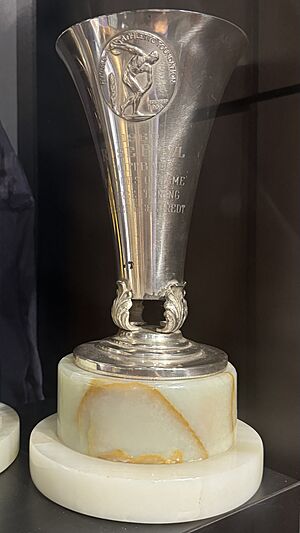
Eight Washington coaches and players have been inducted into the Rose Bowl Game Hall of Fame.
| Name | Position | Tenure | Inducted |
|---|---|---|---|
| Bob Schloredt | QB | 1958–60 | 1991 |
| George Wilson | HB | 1923–25 | 1991 |
| Jim Owens | Head coach | 1957–74 | 1992 |
| Don James | Head coach | 1975–92 | 1994 |
| Warren Moon | QB | 1975–77 | 1997 |
| Steve Emtman | DT | 1988–91 | 2006 |
| George Fleming | HB | 1958–61 | 2011 |
| Mark Brunell | QB | 1988–92 | 2015 |
Notable in Other Fields
Some former Washington players have gone on to achieve success in other areas, like politics or entertainment.
| Name | Position | Tenure | Occupation |
|---|---|---|---|
| Ralph Nichols | Guard | 1892–94 | State Senator, Seattle City Council member |
| William J. Coyle | Quarterback | 1908–11 | Lieutenant Governor of Washington |
| Jim Ferrell | Outside linebacker | 1985–88 | Mayor of Federal Way |
| Bruce Harrell | Linebacker | 1976–79 | Mayor of Seattle |
| Joel McHale | Tight end | 1992–93 | Actor/comedian |
| Nate Robinson | Cornerback | 2002 | NBA player |
Memorable Games: Exciting Moments in History
1975 Apple Cup: A Big Comeback
In the 1975 Apple Cup, Washington State was leading 27–14 with only three minutes left. WSU tried to get a first down instead of kicking a field goal. Washington's Al Burleson intercepted the pass and ran 93 yards for a touchdown! After WSU couldn't score, Warren Moon threw a tipped pass that Spider Gaines caught for a 78-yard touchdown. Washington won dramatically, 28–27.
1981 Apple Cup: Rose Bowl Bound!
The 1981 Apple Cup was a huge game, with both Washington State and Washington ranked in the top 20. Washington's defense was strong, while the Cougars had a great offense. Washington needed to win and for USC to beat UCLA to get a spot in the Rose Bowl.
Washington State tied the game at 10 in the second half. But then Washington's offense took over. They scored two touchdowns and two field goals to win the game. When the score of the USC-UCLA game was announced (USC won!), the Huskies knew they were going to the Rose Bowl!
1985 Orange Bowl: A Surprising Win
The 1984 Huskies were ranked No. 1 in October but lost a game that cost them a Rose Bowl spot. They were invited to play No. 1 BYU in the Holiday Bowl, but chose to play No. 2 Oklahoma in the Orange Bowl instead. This was a bigger, more famous bowl game.
Washington won 28–17. Coach Don James was carried off the field, thinking they would be national champions. However, unbeaten BYU kept their No. 1 spot in the final polls.
1990: "All I Saw Was Purple"
The 1990 game against USC was very important. Washington's defense was incredible, holding USC to only 28 rushing yards. They put so much pressure on USC's quarterback that he famously said, "I just saw purple. That's all. No numbers, just purple." Washington won 31–0.
1992: "A Night To Remember" (The Loudest Game)
Playing their first night game at Husky Stadium, No. 2 Washington beat No. 12 Nebraska. This game created the loudest recorded moment in Husky Stadium history! The crowd noise was so intense that Nebraska's linemen made mistakes. When Nebraska's quarterback was tackled for a safety in his own end zone, the roar was deafening. ESPN measured the noise at over 130 decibels, which is incredibly loud! Washington won 29–14.
1994: The "Whammy in Miami"
The "Whammy in Miami" was a game against the Miami Hurricanes in 1994. Miami had a 58-game home winning streak and was ranked No. 5. Washington was a big underdog. Miami led at halftime, but the Huskies scored 22 points in five minutes in the second half! They dominated the rest of the game, winning 38–20. It was a huge upset!
2002 Apple Cup: Overtime Drama
In the 2002 Apple Cup, No. 3 Washington State was hoping to play for the national championship. Unranked Washington wanted to win the Northwest Championship. WSU led 20–10 late in the game. But Washington's Nate Robinson made a key interception, forcing overtime. In the third overtime, a controversial call on a backward pass ended the game with a Washington victory. The crowd was very upset!
2009: "Miracle on Montlake"
In 2009, Washington played No. 3 USC. Washington had just won its first game in 16 tries. USC started strong, but Washington fought back. The game was tied in the fourth quarter. Quarterback Jake Locker led the Huskies down the field. With only 3 seconds left, Erik Folk kicked the game-winning field goal, giving Washington a 16–13 victory! Fans rushed the field to celebrate.
2010: "Deja Vu"
In 2010, the Huskies played No. 18 USC again. Washington had not won on the road against USC since 1996. The Huskies led for most of the game. In the final seconds, with the score close, Erik Folk kicked another game-winning field goal as time ran out. Washington won, ending their long road losing streak!
2016: "70 in Eugene"
Before this game, Oregon had beaten Washington 12 times in a row. The Huskies, ranked No. 5, traveled to Oregon. Washington ended Oregon's winning streak with a huge 70–21 victory! Washington's offense gained 682 yards and scored 70 points, the most ever by either team in the rivalry.
Future Opponents: What's Next for the Huskies?
Conference Opponents: Big Ten Schedule
Washington joined the Big Ten Conference for the 2024 season. Here's a look at their conference schedule for the next few years.
| 2024 | 2025 | 2026 | 2027 | 2028 |
|---|---|---|---|---|
| vs Michigan | vs Illinois | vs Indiana | vs Maryland | vs Michigan |
| vs Northwestern | vs Ohio State | vs Iowa | vs Michigan State | vs Northwestern |
| vs UCLA | vs Oregon | vs Minnesota | vs Nebraska | vs UCLA |
| vs USC | vs Purdue | vs Penn State | vs Oregon | vs Wisconsin |
| at Indiana | vs Rutgers | at Michigan State | vs USC | at Illinois |
| at Iowa | at Maryland | at Nebraska | at Minnesota | at Indiana |
| at Oregon | at Michigan | at Oregon | at Northwestern | at Maryland |
| at Penn State | at UCLA | at Purdue | at Penn State | at Ohio State |
| at Rutgers | at Wisconsin | at USC | at Rutgers | at Oregon |
Non-Conference Opponents: Games Outside the Big Ten
Here are some of Washington's future non-conference games.
| Year | Date | Opponent | Conference | Site | Notes |
|---|---|---|---|---|---|
| 2025 | Aug 30 | Colorado State | MW | Husky Stadium • Seattle, WA | |
| Sep 6 | UC Davis | Big Sky | Husky Stadium • Seattle, WA | FCS | |
| Sep 20 | Washington State | TBD | Martin Stadium • Pullman, WA | Apple Cup | |
| 2026 | Sep 5 | Washington State | TBD | Husky Stadium • Seattle, WA | Apple Cup |
| Sep 19 | Eastern Washington | Big Sky | Husky Stadium • Seattle, WA | FCS | |
| 2027 | Sep 4 | Fresno State | MW | Husky Stadium • Seattle, WA | |
| Sep 18 | Washington State | TBD | Martin Stadium • Pullman, WA | Apple Cup | |
| 2028 | Sep 2 | Eastern Washington | Big Sky | Husky Stadium • Seattle, WA | FCS |
| Sep 16 | UNLV | MW | Husky Stadium • Seattle, WA | ||
| TBD | Washington State | TBD | Husky Stadium • Seattle, WA | Apple Cup | |
| 2029 | Sep 1 | Tennessee | SEC | Neyland Stadium, Knoxville, TN | 1st meeting |
| Sep 8 | Boise State | MW | Husky Stadium • Seattle, WA | ||
| 2030 | Sep 7 | Tennessee | SEC | Husky Stadium • Seattle, WA | |
| Sep 14 | Hawaii | MW | Husky Stadium • Seattle, WA |
Images for kids
 | Laphonza Butler |
 | Daisy Bates |
 | Elizabeth Piper Ensley |


